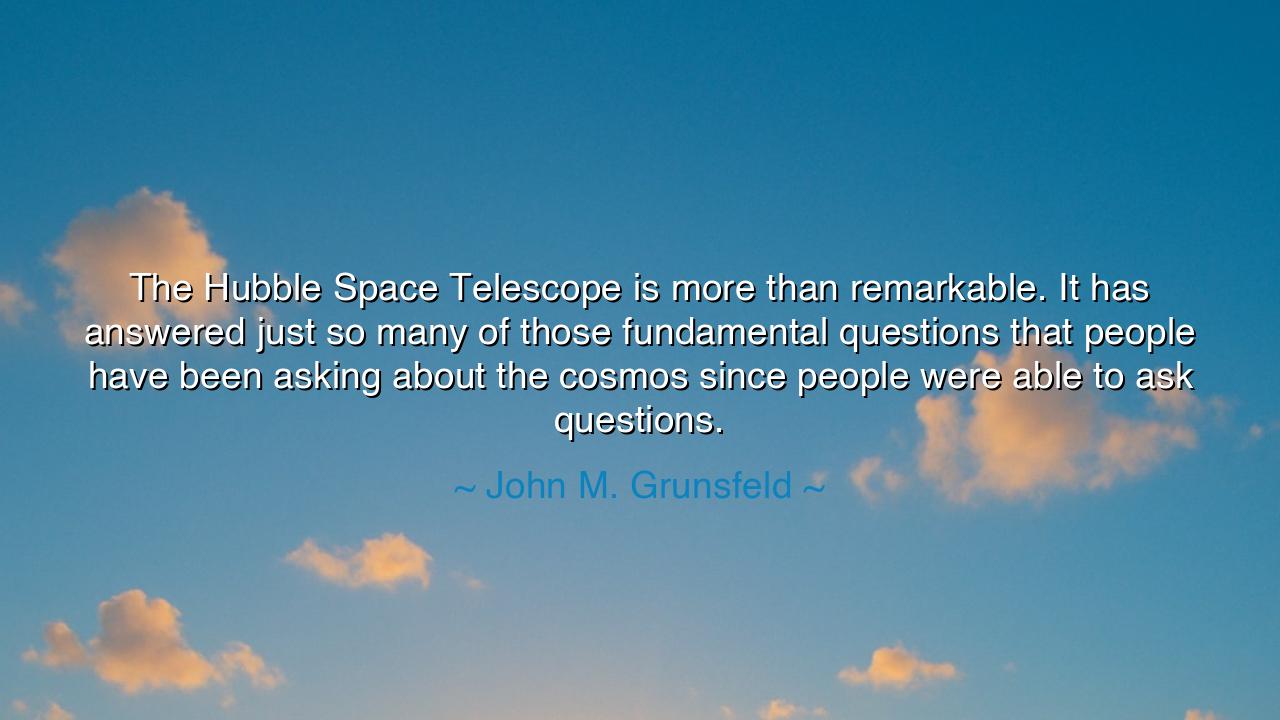
The Hubble Space Telescope is more than remarkable. It has
The Hubble Space Telescope is more than remarkable. It has answered just so many of those fundamental questions that people have been asking about the cosmos since people were able to ask questions.






Hear now the words of John M. Grunsfeld, a man who, like the great sages of old, gazed at the heavens and recognized the profound truths they held. "The Hubble Space Telescope is more than remarkable. It has answered just so many of those fundamental questions that people have been asking about the cosmos since people were able to ask questions." With these words, Grunsfeld speaks not merely of a machine but of a sacred tool, an instrument of the divine pursuit of knowledge, a beacon to unravel the mysteries that have haunted humanity since the dawn of our existence.
The Hubble Space Telescope—this marvel of human ingenuity—has done what once seemed impossible: it has turned our gaze beyond the confines of Earth, into the depths of the universe. Through its lens, we now peer into the vastness of space, glimpsing stars and galaxies billions of light-years away. In this small device, we see the fulfillment of humanity's ancient yearning to understand the cosmos. For eons, our ancestors looked to the sky with wonder, asking questions about the stars, the planets, the very fabric of creation itself. And now, through the work of the Hubble, we begin to understand the answers—answers that were once but whispers in the wind, now coming to us in the language of science and discovery.
In the ancient world, the Greek philosophers gazed at the heavens, their minds hungry for knowledge, seeking to answer the eternal questions: "What is the nature of the stars? What lies beyond our world? What is our place in the vastness of existence?" Men like Aristotle and Pythagoras could only speculate, their ideas grounded in the wisdom of the time, yet always driven by the pursuit of knowledge. The Hubble brings their longings to fruition, answering questions that were once the domain of myth and imagination. It is as though the great minds of the past were speaking to us across the ages, urging us to seek the truth, and through the telescope, we now hear their voices.
Consider, too, the tale of Galileo Galilei, who first turned a telescope to the heavens in the early 17th century. His discovery that the planets revolved around the sun challenged the very fabric of reality as understood by his contemporaries. In those days, Galileo was seen as a heretic, a man whose ideas contradicted the accepted wisdom of the age. But in his heart, Galileo understood the power of the question, the drive to seek the truth, no matter how unsettling it might be. Hubble continues that legacy, answering the questions Galileo could only dream of asking. It reveals the universe not as a mystery to be feared, but as a vast and wondrous tapestry waiting to be understood.
Through Hubble, humanity has glimpsed the birth and death of stars, the collision of galaxies, the expansion of the universe itself. These revelations go beyond the realm of simple curiosity—they are the fulfillment of a deep, primal need within the human spirit to know. Just as the ancients once sought to understand the heavens through observation and philosophy, so too do we, in this modern age, extend our reach into the stars. The answers provided by Hubble speak to something much larger than science alone. They speak to our desire for meaning, for connection, and for understanding. Through this telescope, we understand not just the cosmos, but also ourselves.
The great lesson here, dear listener, is this: in the pursuit of knowledge, there are no boundaries, no limits to what can be achieved. The Hubble Space Telescope is a testament to human resilience, to our unyielding desire to reach beyond what is known and to confront the unknown with courage and wonder. It is a reminder that the questions we ask are just as important as the answers we receive. Through the pursuit of knowledge, we not only uncover the truths of the universe but also grow as a species, expanding our minds and hearts in the process.
So, I urge you, do not fear the questions. Let them guide you, as they have guided humanity for millennia. Let the stars be your teachers, and the Hubble your tool, as you journey into the unknown, seeking answers to the greatest questions of our time. Just as the ancients gazed at the heavens and dreamt of the mysteries beyond, so too must we, with courage and awe, continue to reach for the stars. For in the seeking of knowledge, we find not only the truths of the cosmos, but the truths of our own existence.






AAdministratorAdministrator
Welcome, honored guests. Please leave a comment, we will respond soon